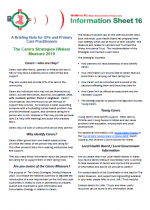WaMH in PC's blog
Information Sheet 16 - The Carers Strategies (Wales) Measure 2010
Carers look after family, partners or friends who are ill, frail or may have a disability and in need of help and support provide 97% of all care in the community.
They may not see themselves as Carers but, above all, as a parent, child, wife, husband, partner, friend or neighbour.
The Carers Strategies (Wales) Measure 2010 enables the National Assembly to legislate the introduction of a new requirement on Welsh NHS and Local Authorities to work in partnership to prepare, publish and implement a joint Information and Consultation Strategy for Carers.
Information Sheet 16 provides help and resources to support GPs and practice staff in the support of carers via signposting to local agencies and national organisations.
Like all our Information Sheets this latest document aims to help raise awareness about and improve mental health services across the country.
Each of our sheets have been developed to provide valuable information, training and support tools on primary care mental health in Wales.
Their publication comes under the set objectives of our Gold Standard Project which has set the goal of providing good communication on mental health issues .
We have a range of other Information Sheets which are all available to download and view on and from our Information Sheets page.
If you have any questions about Information Sheet 16 or trouble viewing or downloading it please contact our Project Manager Lesley Hills via email at lhills@rcgp.org.uk or on 029 2050 4516.
Foundation for People with Learning Disabilities (FPLD) releases report about mental health services and resources
 The Foundation for People with Learning Disabilities has released a released a new report to show how mental health services can better support people with learning disabilities.
The Foundation for People with Learning Disabilities has released a released a new report to show how mental health services can better support people with learning disabilities.
In line with the government’s No Health Without Mental Health strategy, the Foundation for People with Learning Disabilities (FPLD) has undertaken a project to find out about the barriers which make it difficult for people with learning disabilities to access mental health services and resources.
The FPLD has worked for many years with people with learning disabilities and their families who have told them that they do not get support to think about mental health or to talk about mental health problems in the same way as they do with physical health.
The organisation wants to make it easier for people with learning disabilities and their families to navigate the mental health system and access services when they need them.
As part of this work it surveyed families of people with learning disabilities, people with learning disabilities and people who work in mental health services to find out their views.
This has resulted in the publication of its Feeling Down: Improving the mental health of people with learning disabilities report which aims to show commissioners how services can better support people with learning disabilities.
The organisation also has the following 2 other versions of the guide for people with learning disabilities and their families and supporters:
- Feelind Down: Easy read summary - a simplified version to help people with learning disabilities understand the aims of the main Feeling Down report
- Feeling Down: Looking After My Mental Health - another simplified report to help people with learning disabilities think about and look after their mental health with the help of interactive sections
For further information on learning disabilities and the Feeling Down report please visit the FPLD website.
Finnish Study Claims Healthy Midlife Diet Can Cut Dementia
New research claims that 40-year-olds who start a diet of full of vegetables, fruit and fish cuts their risk of developing dementia by 90%.
The University of Eastern Finland study found a higher intake of saturated fats from butter, cakes and fast food is linked to poorer cognitive functions and an increased chance of dementia.
However, those who follow a healthier diet between the ages of 40 and 50 can drasticay reduce their risk of developing dementia by their 60s.
The research was the first in the world to investigate the relationship between a healthy midlife diets and the risk of developing dementia later on.
Researchers assessed the link between diet and dementia using a healthy diet index based on the consumption of a variety of foods.
For further information please read the following news story on the Daily Express website Healthy diet in midlife slashes dementia by 90%.
According to Welsh official figures, there are currently just over 42,700 people living with dementia in Wales and much work has taken place nationally to identify the areas which need to be addressed in order to improve the lives of those with and affected by this condition.
This has led to the creation of the National Dementia Vision for Wales which provides a long-term vision to ensure our country can best meet the challenge of the increasing number of people living with dementia.
As an organisation we are now focussing on dementia and the mental health issues it raises across Wales with further information available in our Dementia section on this website.
If you have any questions about WaMH in PC's work with dementia in Wales please contact us via email at lhills@rcgp.org.uk or on 029 2050 4516.



